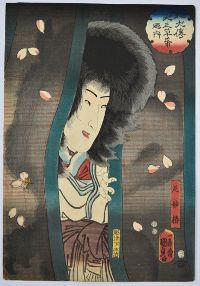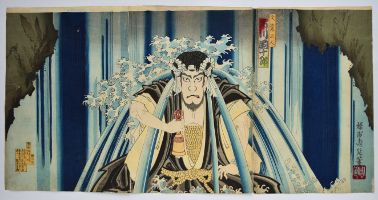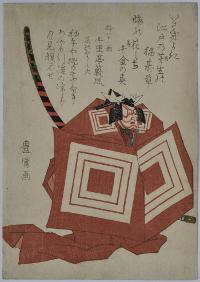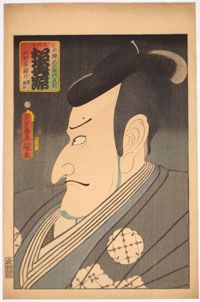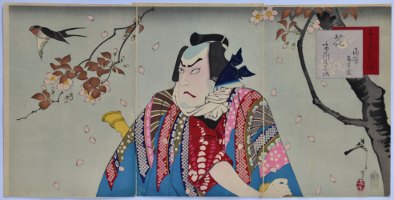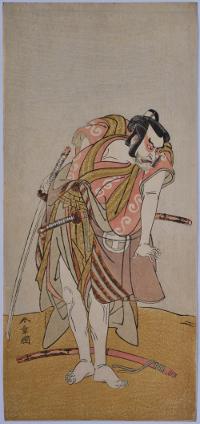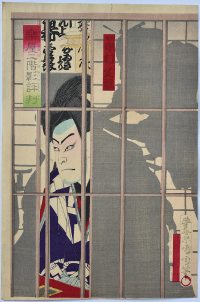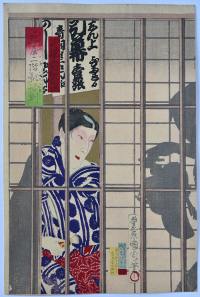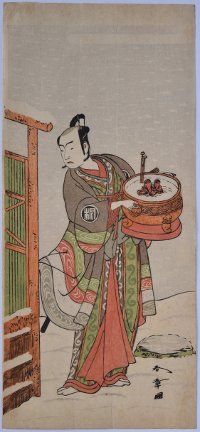/category/actors/
Shunkosai HOKUEI (FL. 1829-1837)
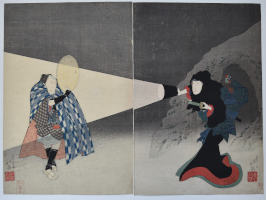
Click here to view image full size.
A dramatic diptych showing the actor Iwai Shijaku I as Lady Osuma shining her lantern on the actor Bando Jutaro as Sasaya Hanbei from the play Honobonoto ura no asagiri, “Daybreak Hidden on the Bay by Morning Fog.” A revenge drama performed at the Naka no Shibai, Osaka, 9/1832. Hanbei is an accomplice of the villain in the play, Karahashi Daisuke. The confrontation takes place immediately after he has murdered the fiancée of the play’s hero, Kowari Dennai, by throwing her off a cliff. He makes his escape by throwing shuriken (star-shaped throwing blades) at Osuma.
Very fine impression. This is a de-luxe edition of the first state “surimono-style.” The hand-stamped block cutter’s seal “surimono cut by Kasuke” bottom left of second sheet. A later edition missing seal was published by Iden. Fine colour with burnished pattern on Osuma’s costume and the poem above is written in metallic pigment. Fine condition. Signed Shunkosai Hokuei ga with seal fumoto no yuki.
Status: Available
Price: £1,500
Utagawa KUNISADA (1786-1864)
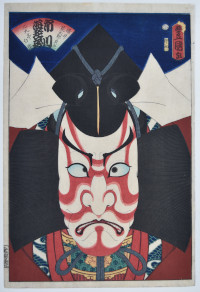
Click here to view image full size.
The actor Ichikawa Ebizo V (Ichikawa Danjuro VII) in a Shibaraku scene as the warrior Usui Arataro Sadamitsu (Taira no Tadamichi) adopting the cross-eyed mie expression to show great emotion. From an untitled set of large-head portraits of actors, past and present, published by Ebisuya Shoshichi (Kinshodo) between 1860 and 1865, this being 1860. Kunisada, in his old age, planned this set to have 150 designs but only 72 were completed (with the help of Utagawa Yoshitora). Only the best materials and most experienced engravers and printers were employed, the cost being mitigated by the Mitani copper and iron merchant family.
Fine impression with heavy burnishing on the hair. Very slight fading, otherwise very good colour. Very good condition. Signed Toyokuni ga.
Status: Available
Price: £5,800
Toyohara KUNICHIKA (1835-1900)
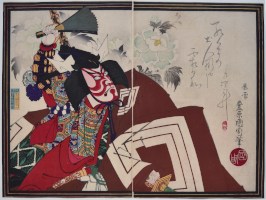
Click here to view image full size.
A diptych showing the actor Ichikawa Danjuro IX as Kamakura Gongoro Kagemasa in the drama Shibaraku, “Just a moment.” The large sansho (three square) motif was the symbol of the Danjuro clan and is repeated around the border. In the background are peonies, also associated with the Danjuro clan. Published by Tanaka Katsuzo, 1878.
Fine impression, colour and condition. Signed Oju Toyohara Kunchika hitsu.
Status: Available
Price: £1,250
Toyohara KUNICHIKA (1835-1900)
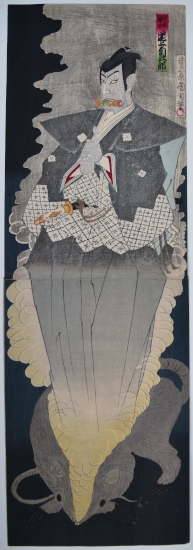
Click here to view image full size.
A vertical diptych showing the actor Onoe Kikugoro V as the archvillain and sorcerer Nikki Danjo emanating in a cloud of smoke from his alter ego – the giant rat. He holds in his mouth the scroll containing the names of the conspirators given to Masaoka which he has purloined. This is one of the great scenes in Kabuki from the play Meibuku Sendai hagi, “Precious Incense and the Bush Clover of Sendai.” Kikugoro rises through a trapdoor (suppon) which is on the hanamachi leading out from the Kabuki stage. Published by Fukuda Kumajiro, 1887. Rare.
Very good impression and colour. Heavy oxidation, otherwise very good condition. Signed Toyohara Kunichika fude.
Status: Available
Price: £4,200
Utagawa KUNIYOSHI (1797-1861)
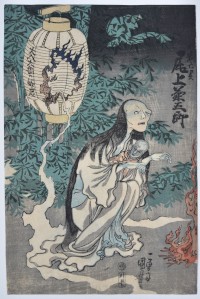
Click here to view image full size.
The actor Onoye Kikugoro III as the ghost of Oiwa from a production of Yotsuya kaidan at the Morita Theatre, 1836. Probably the most famous Japanese ghost story. It was adapted by the playwright Tsuruya Nanboku IV for his friend Kikugoro in 1825. The left panel of a diptych (the right panel being boring and usually ignored). A scene on Snake Mountain showing Oiwa, disfigured by poison, emerging from a burning lantern to haunt her husband, Tamiya Lemon, who had murdered her father. Published by Kawaguchi-ya Chozo, 1836.
Very good impression, colour and condition. Signed Ichiyusai Kuniyoshi ga.
Status: Available
Price: £1,350
Utagawa KUNISADA (1786-1865)
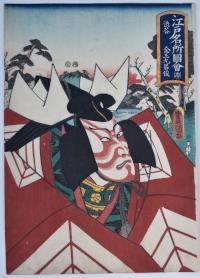
Click here to view image full size.
The actor Ichikawa Danjuro VIII as Shibuya Konnomaru Masatoshi from a set Edo meisho zue, “Famous Places of Edo.” This being Shibuya. Published by Iseya Chusuke 1852.
Very good impression. Good colour and condition. Signed Toyokuni ga.
Status: Available
Price: £900
Utagawa KUNISADA (1786-1865)
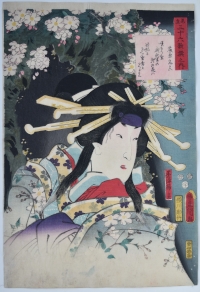
Click here to view image full size.
The actor Segawa Kikunojo III as the Spirit of the Komachi Cherry Tree from a set Mitate sanjurokkasen no uchi, “An Imaginary Thirty-six Poets.” A famous early compilation; in this case the image is inspired by a poem of Fujiwara no Motozane. The spirit is the courtesan Kurozome who appears to combat the evil plans of Sekibei (actually Otomo no Kuronushi) to cut the tree down. Published by Iseya Kanekichi, 1852.
Fine impression. Fine colour. Very small binding holes otherwise very good condition. Signed Toyokuni ga.
Status: Available
Price: £1,280
Utagawa YOSHIIKU (1833-1904)
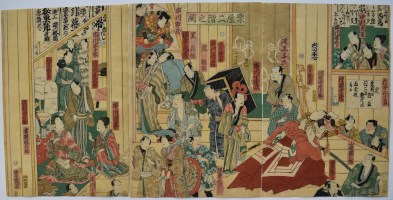
Click here to view image full size.
A fascinating triptych showing the backstage activities on the second floor of a kabuki theatre, Gakuya ni-kai no zu. Twenty-one actors are shown, mostly in their street clothes, together with assistants. However, on the right sheet can be seen an actor in full Shibaraku costume while the centre sheet has Ichikawa Ichizo III descending the stairs. Below is the actor Bando Mitsugoro VI in an onnagata role. On the left sheet can be seen another actor in an onnagata role applying his makeup. This is the bottom half of a hexaptych. Published by Izutsuya Shokichi, c 1861. This design is loosely based on the bottom half of a hexaptych designed by Kunisada in 1856. Rare.
Very good impression and colour. Minor defects, otherwise very good condition. Signed Yoshiiku ga.
Status: Available
Price: £1,800
Toyohara KUNICHIKA (1835-1900)
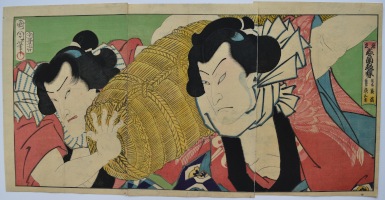
Click here to view image full size.
A triptych with the title Mitate haruzumo futatsu chocho, “An Imaginary Spring Sumo Match with two Butterflies.” A parody of the famous Sumoba, “Sumo Scene” in the pay Futatsu chocho kuruwa nikki, “A Diary of two Butterflies in the Pleasure Quarters.” Shows the actors Ichimura Kakitsu IV (left) as the wrestler Chokichi and Bando Hikosaburo V (right) as his rival Chogoro. The names of both wrestlers begin with “Cho” and two of them together makes “Chocho” which also means “butterfly.” Published by Otaya Takichi, 1866.
Very good impression and colour. Backed, otherwise very good condition. Signed Kunichika ga.
Status: Available
Price: £1,200
Katsukawa SHUNJO (?-1787)
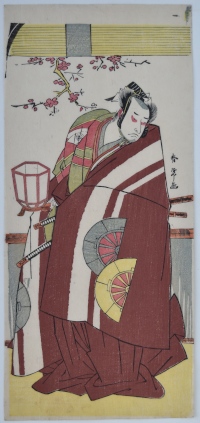
Click here to view image full size.
An hosoban showing the actor Onoe Matsusuke I in a Shibaraku role holding a lantern. (Possibly as Sakata no Kintoki). Shunjo was a pupil of Katsukawa Shunsho. Published c 1780.
Fine impression. Very fine colour and condition. Signed Shunjo ga.
Status: Available
Price: £5,800
Utagawa KUNISADA (1786-1865)
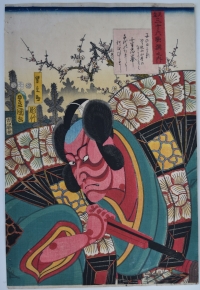
Click here to view image full size.
The actor Ichikawa Danjuro VIII as Arajishi Otokonosuke from a set Mitate sanjurokkasen no uchi, “An Imaginary Thirty-six Poets.” A famous early compilation; in this case the image is inspired by a poem of Mibu no Tadamine. Otokonosuke is usually depicted about to strike his adversary Nikki Danjo -who has turned into a rat – with an iron fan (leaving a red mark on the rat’s/Danjo’s head). Published by Iseya Kanekichi, 1852.
Very fine early impression. Fine colour. Very small binding holes, otherwise very good condition. Signed Toyokuni ga.
Status: Available
Price: £750
Utagawa KUNISADA (1786-1865)
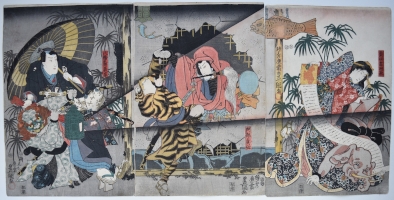
Click here to view image full size.
A triptych of a probably imaginary performance showing the actor Ichimura Uzaemon XII as Hachiman Taro Yoshiie (far left) with an actor dressed as a lion who shines a strong beam from a lantern across the other two sheets; the centre one showing the actor Ichikawa Danjuro III as Abe Sadato with an actor dressed as a lion, and the right sheet showing the actor Bando Shuka I as Sadato’s wife Sodehagi with an actor dressed as an elephant. Published by Miyakozawa 1847-52.
Very good impression, colour and condition. Signed Hanmoto no oujyu Toyokuni ga, “By the request of the publisher, painted by Toyokuni.”
Status: Available
Price: £1,200
Katsukawa SHUNSHO (1726-1792)
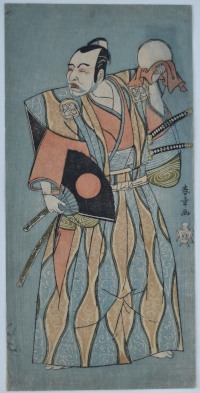
Click here to view image full size.
An hosoban showing the actor Nakamura Utaemon I as a samurai in nagabakama and kamishimo ceremonial dress as worn during the Muromachi period (1336-1392). He holds a fan and a globe. Shunsho was the pre-eminent exponent of the hosoban format. Published c 1770.
Fine impression. Unusual blue ground found on a few Shunsho designs. Slight discolouration on verso showing through, otherwise good condition. Signed Shunsho ga with the jar-shaped (tsubo) seal.
Status: Available
Price: £2,500
Okumura MASANOBU (1686-1764)

Click here to view image full size.
One of the most influential and innovative print designers, publishers and painters. He is also credited with inventing the hashira-e as well as being the first to use multiple-block printing. A wide hashira-e (habahiro hashira-e, 24 x 6 in; 61 x 15 cms) showing the actor Sanogawa Ichimatsu I. Masanobu designed a number of prints showing this popular actor who started the fashion for the hisobi pattern on his costume which is now called the Ichimatsu moyo. Published by Masanobu c 1741. Rare.
Fine impression. Hand-applied colour: yellow, light red and light orange. Slight fading, otherwise very good condition. Signed Hogetsudo shomei Okumura Bunkaku Masanobu shohitsu, “Truly published by Hogetsudo and true brush by Okumura Masanobu” with seal Tanchosai.
Status: Available
Price: On request
Toyohara KUNICHIKA (1835-1900)
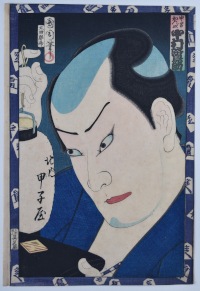
Click here to view image full size.
The actor Nakamura Shikan IV as Ishikawa Hachizaemon in the play Chuko musashi no abumi staged at the Nakamura-za Theatre in 4/1869. From a set of at least 22 prints published by Gusokuya Kahei, 1869. Kunichika was a hack artist who nevertheless produced some fine triptychs (horizontal and vertical) and this fine set of actor bust portaits.
Fine impression and colour. Minor edge soil, otherwise very good condition. Signed Kunichika hitsu.
Status: Available
Price: £1,300
Shunbaisai HOKUEI (Active 1824-1837)
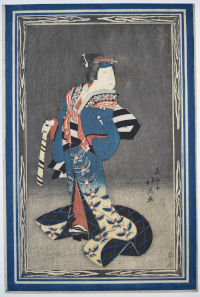
Click here to view image full size.
Shows the actor Arashi Rikan II as the yako Koman holding a shakuhachi and posed within a wooden frame in the play Sugata kurabe deiri no minato, “Comparison of Fighting Figures at the Harbour.” Performed in 1834 at the Naka Theatre, Osaka. A yako was a chivalrous servant, usually of a samurai. Rare: Another impression is in the MIA, acc. no P.75.51.188.
Fine impression with the woodgrain enhanced on the background. Fine colour and condition. Signed Shunbaisai Hokuei ga with the carver’s seal bottom right Kasuke.
Status: Available
Price: £1,500
Toyohara KUNICHIKA (1835-1900)
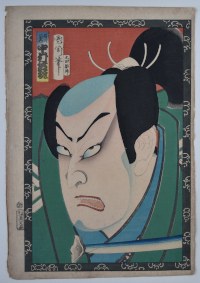
Click here to view image full size.
The actor Nakamura Sagisuke in the role of the samurai attendant Kanji (Chugen Kanji) in the play Kichisama mairu yukari no otozure which was premiered at the Nakamura-za Theatre 15/7/1869. From a set of at least 22 prints published by Gusokuya Kahei, 1869. Kunichika was a hack artist who nevertheless produced some fine triptychs (horizontal and vertical) and this fine set of actor bust portaits.
Fine impression and colour. Slight trimming, otherwise very good condition. Signed Kunichika hitsu.
Status: Available
Price: £1,280
Toyohara KUNICHIKA (1835-1900)
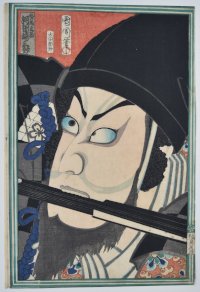
Click here to view image full size.
The actor Kawarasaki Sansho (later Ichikawa Danjuro IX) in the role of Sato Masakiyo in the Momoyama Goten Ohiroma scene from Momoyama Monogatari performed at the Ichimura-za Theatre, 8/1869. From a set of at least 22 prints published by Gusokuya Kahei, 1869. Kunichika produced some fine triptychs (horizontal and vertical) as well as this fine set.
Fine impression and colour. Slightly trimmed, otherwise very good condition. Signed Kunichika hitsu.
Status: Available
Price: £1,200
Tsukioka YOSHITOSHI (1839-1892)
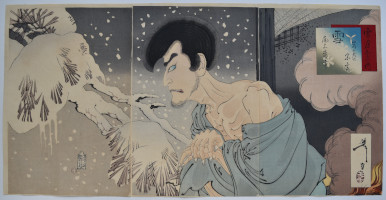
Click here to view image full size.
A triptych showing the priest Iwakura Sogen in a snowy garden. “Snow” from a set of three half-length portraits of actors with title: Setsugekka no uchi, “Snow, Moon, and Flowers.” Sogen was infatuated with the beautiful courtesan Irokotohime. He broke his vow of chastity and was expelled from his temple. Unfortunately, Irokotohime dies and Sogen is left with just his memories. There are other versions of this story and a play with the actor Onoe Baiko V. Published by Akiyama Buemon, 1890.
Fine impression of the first edition with variegated and unaltered sub-cartouche. Fine colour and condition. Signed Yoshitoshi ga.
Status: Available
Price: £3,800
Toyoharu KUNICHIKA (1835-1900)
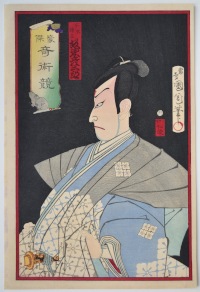
Click here to view image full size.
The actor Bando Hikosaburo V as Nikki Danjo from a set Goketsu kijutsu kurabe, “Competition of the Magicians.” Published by Matsui Eikichi, 1873/4. Hikosaburo played Nikki Danjo in the play Date zensei kuruwa kagami at the Murayama Theatre, 3/1872. The story relates how Nikki Danjo retrieves the list of conspirators against the Lord of Oshu by changing into a rat. A guard attacks the rat and strikes it on the head with an iron fan. It transmogrifies into Nikki Danjo. This sensational scene in kabuki has Nikki Danjo emerging through a trapdoor in the hanamachi in a cloud of smoke. He is usually shown with the scroll of conspirators in his mouth and a red mark on his forehead where he was hit by the fan.
Very fine impression. Fine colour and condition. Signed Oju Kunichika hitsu.
Status: Available
Price: £550
Katsukawa SHUNSHO (1726-1793)
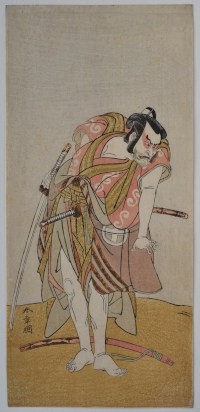
Click here to view image full size.
The actor Otani Hiroji III as a samurai, one sword drawn and facing an adversary. Shunsho was the founder of the Katsukawa school and had many pupils (including Hokusai [Shunro]). He was a prolific designer of hosoban actor prints and produced some of the finest designs in this format. Published c 1775.
Fine impression. Very good colour. Fine condition. Signed Shunsho ga.
Status: Available
Price: £3,200
Utagawa KUNIYOSHI (1797-1861)
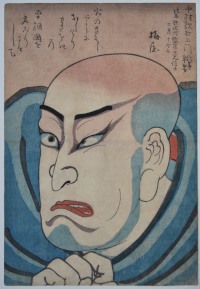
Click here to view image full size.
A dramatic shini-e (“memorial picture”) of the kabuki actor Nakamura Utaemon IV. Unsigned, as is usual with this sort of print, but the attribution to Kuniyoshi is certain: An original Kuniyoshi preparatory drawing for this print exists in the Rijksmuseum, Leiden (3513-663). Utaemon is shown in the role of Taira Kiyomori, the leader of the Taira Clan, seen here dressed as a monk. The print gives the date of his death as 17/2/1852. The tanka poem, above, is by Kuniyoshi’s friend the poet Umeya Kakuju (Murota Matabei).
Fine impression and colour. Slight trimming and centre fold, otherwise very good condition.
Status: Available
Price: £1,800
Tsukioka YOSHITOSHI (1839-1892)
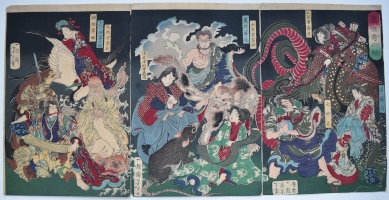
Click here to view image full size.
A triptych Goketsu kijutsu kurabe, “A competition Among Powerful Magicians.” Published by Masadaya, 1869. A compilation of well known sorcerers, wizards and magicians. From right to left: Iwafuji Tsubone, Senkanja Yoshitora, Orochimaru, Otomo Wakanahime, Madamaru, Sumizu Kanja Yoshitaka, Mori Soiken, Kusunoki Goma-hime.
Good impression, colour. Slight toning, otherwise good condition. Signed Ikkaisai Yoshitoshi hitsu, Ikkaisai Yoshitoshi ga, Oju Ikkaisai Yoshitoshi ga.
Status: Available
Price: £4,700
Utagawa TOYOMARU (SHUNRO II) (Act. 1785-1797)
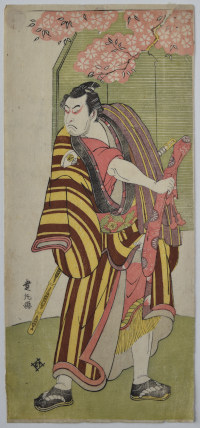
Click here to view image full size.
The actor Onoe Matsusuke, probably in the role of Matsuo-maru in the play Sugawara denju tenarai kagami. Published c 1780s by Igaya Kan’emon (Bunkido).
Fine impression, colour, and condition. Signed Toyomaru ga.
Status: Available
Price: £3,800
Utagawa KUNISADA (1786-1865)
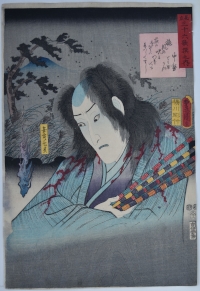
Click here to view image full size.
The actor Onoe Kikugoro III as the ghost of Yasukata from a set Mitate sanjurokkasen no uchi, “An Imaginary Thirty-six Poets.” A famous early compilation; in this case the image is inspired by a poem of Nakatsukasa.The ghost haunted the ruined palace of Soma at Sashima. Published by Iseya Kanekichi, 1852.
Fine early impression. Fine colour. Very small binding holes and slight discolouration at left edge, otherwise very good condition. Signed Toyokuni ga.
Status: Available
Price: £1,500
Utagawa YOSHITORA (Fl. c 1850-1880)
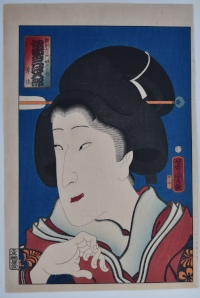
Click here to view image full size.
An okubi-e of the onnagata actor Bando Mitsugoro V in the role of Shindo Saemon’s daughter Yushide. From a set of large heads of actors past and present which were to be the pinnacle of Kunisada’s career. The set was intended to have one hundred and fifty prints but only seventy-two were completed (with Yoshitora designing twelve). Only the most expensive materials and the finest printers and engravers were employed. Shows Yushide in the play Karukaya doshin tsukushi no iezuto who, in a fit of remorse, stabs herself in the throat with an arrow (seen here used as a hair pin). Published by Ebisuya Shoshichi, 1862.
Very fine impression and colour. Fine condition. Signed Yoshitora ga.
Status: Available
Price: £2,000
Toyohara KUNICHIKA (1835-1900)
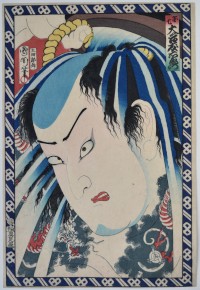
Click here to view image full size.
The actor Otani Tomoemon V as Danshichi Kurobei, a fishmonger and an Osaka otokodate, in the drama Natsu matsuri Naniwa kagami, “Summer Festival: Mirror of Osaka.” From an untitled set of large-head actor portraits published by Gusokuya Kahei, 1869. Based on actual events, the scene depicted here is from Act VII of the play where the heavily tattooed Danshichi has murdered his wife’s father, the untrustworthy Mikawaya Giheiji, and is pouring water from a bucket over himself to wash off the mud from the murder scene. Probably the best design from the set.
Fine impression and colour. Very good condition. Signed Kunichika hitsu.
Status: Available
Price: £2,200
Katsukawa SHUNKO (1743-1812)
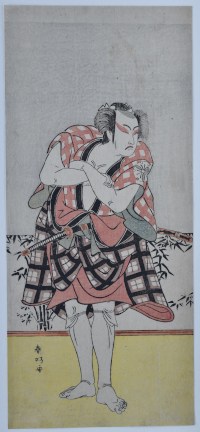
Click here to view image full size.
The actor Matsumoto Koshiro II, arms crossed, in a defiant stance. Shunko had a minor stroke at the age of 45 and subsequently had to work with his left hand using the go of Sahitsusai, “Studio of the Left-handed Brush.” Published c 1771-1772.
Very good impression, colour and condition. Signed Shunko ga.
Status: Available
Price: £2,800
Toyohara KUNICHIKA (1835-1900)
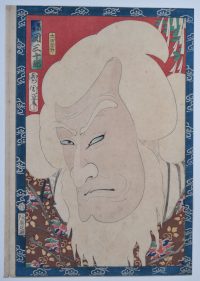
Click here to view image full size.
The actor Seki Sanjuro III as Saruta Hiko in the play Yoinakatomi Kiyome no mikagura staged at the Ichimura-za Theatre 8/1869. From a set of at least 22 prints published by Gusokuya Kahei, 1869. Kunichika was a hack artist who nevertheless produced some fine triptychs (horizontal and vertical) and this fine set of actor bust portaits.
Fine impression with extensive blind-printing on the beard and hair. Fine colour. Slight foxing and crease in left margin, otherwise very good condition. Signed Kunichika hitsu.
Status: Available
Price: £1,300
Utagawa KUNISADA II (1823-1880)
Click here to view image full size.
The actor Segawa Kikunojo V in the role of Ama Myochin, the Cat Witch, from the set Hakkenden inu no soshi no uchi, the Eight Dog Heroes, published by Tsutaya Kichizo, 5/1852. The play was premiered at the Ichimuraza Theatre, 1/1852. This is the highlight of the play: The monstrous cat murders the father of the dog hero Inamura Kakutaro and then assumes his likeness. However, as shown here, its hairy body and giant claws can still be seen behind the bamboo curtain. The best design from the set.
Fine impression and colour. Minor trimming, otherwise very good condition. Signed Ichiyosai Kunisada ga.
Status: Sold
Toyohara CHIKANOBU (1838-1912)
Click here to view image full size.
A fine triptych showing the actor Ichikawa Danjuro IX (1838-1903) as the priest Mongaku Shonin. The priest is shown, with Buddhist bell in hand, beneath the freezing waters of the Nachi Waterfall doing penance for inadvertently killing his cousin and lover, Kesa Gozen. Eventually the deity Fudo Myo-o takes pity on him and helps him through the ordeal. Danjuro also played the role of Fudo Myo-o in this performance of the play Hashi kuyo bonji no Mongaku, “The Austerities of Mongaku” at the Ichimuraza Theatre, May 1883. The Danjuro family worshipped the deity Fudo Myo-o. Published by Morimoto Junzaburo, 1883. This must have been a particularly successful performance as there are a number of prints commemorating it and it is listed as one of the great roles of his canon.
Fine impression and colour. One careful area of restoration, otherwise very good condition. Signed Yoshu Chikanobu fude.
Status: Sold
Utagawa Toyokuni I (1769-1825)
Click here to view image full size.
A pupil of Toyoharu, he is best known for his fine actor prints at the end of the 18th century. He had many pupils. A koban surimono showing Ichikawa Danjuro VII in Shibaraku with the voluminous costume and chikara gami “strength papers” sticking up at the back of his wig. Issued for the New Year 1810 (confirmed by the characters hatsu-ushi [“the first year of the ox”] in the first line of the left-hand poem). Interestingly, Danjuro did perform Shibaraku in the play Misao no hana toba koizuka at the Ichimura-za theatre just a couple of months before (11th month, 1809). The role name being Kaneomaru.
Very good impression and colour. Minor toning, otherwise very good condition. Signed Toyokuni ga.
Status: Sold
Utagawa KUNISADA (1786-1865)
Click here to view image full size.
Matsumoto Koshiro V as the evil retainer Nikki Danjo who plots to overthrow his lord in the play Meiboku sendai hagi, “Precious Incense and the Bush Clover of Sendai.” From the last great actor set which was planned as a monument to his career and only used the most expensive materials. An untitled set with seventy-two prints completed on his death. ( One hundred and fifty were intended and some are in fact by Yoshitora. ) This is one of the best designs from the set showing a fine profile of an actor who was nicknamed Hanataka Koshiro, “Big-nosed Koshiro.” He made this role very much his own and to this day many actors still wear a mole on their foreheads in his honour. Published 1863 by Kinshodo.
Very fine impression. Fine colour with extensive burnishing to the hair. On thick hosho and with the extra large margins of the first issues before being bound into albums. Slight soil at edge of margins, top and bottom, otherwise very good condition. Signed Nanajuhassai ( “At the age of seventy-eight” ) Toyokuni ga.
Status: Sold
Tsukioka YOSHITOSHI (1839-1892)
Click here to view image full size.
Flowers from a set of three triptychs showing half-length portraits of actors based on the Snow, Moon, Flowers theme. Shows the actor Ichikawa Sadanji as Gosho no Gorozo, the main character in the play Soga moyo tateshi no goshozome, “The Story of Gorozo, the Chivalrous Commoner.” A complex story which ends with Gorozo killing his old master’s lover, the courtesan Oshu. Published by Akiyama Buemon, 1890.
Fine impression, colour and condition. Signed Yoshitoshi.
Status: Sold
Katsukawa SHUNSHO (1726-1792)
Click here to view image full size.
A hosoban of the actor Otani Hiroji III in the role of a samurai, one sword drawn with the scabbard lying at his feet. Published c 1776.
Fine impression. Very good colour. Fine condition. Signed Shunsho ga.
Status: Sold
Toyohara KUNICHIKA (1835-1900)
Click here to view image full size.
The actor Nakamura Shikan IV as Daizen from a fine set of prints showing actors glimpsed through their dressing room sliding doors, prior to going on stage. Their figures partly silhouetted as are their assistants, here aiding the actor with his headpiece. From a set Gakuya nikai kage no hyoban, “Popularity of the Upstairs Dressing Room.” The set published by Takagawa Fusajiro, 1883.
Fine impression, colour and condition. Full size. Signed Toyohara Kunichika hitsu.
Status: Sold
Toyohara KUNICHIKA (1835-1900)
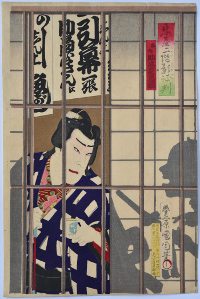
Click here to view image full size.
The actor Suketakaya Takasuke IV as Sakuramaru from a fine set of prints showing actors glimpsed through their dressing room sliding doors, prior to going on stage. Their figures partly silhouetted as are their assistants, here aiding the actor with his sword. From a set Gakuya nikai kage no hyoban, “Popularity of the Upstairs Dressing Room.” The set published by Takagawa Fusajiro, 1883.
Fine impression, colour and condition. Full size. Signed Toyohara Kunichika hitsu.
Status: Sold
Toyohara KUNICHIKA (1835-1900)
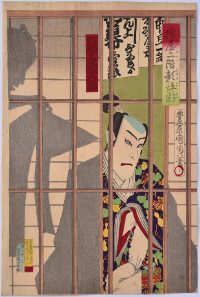
Click here to view image full size.
The actor Onoe Kikugoro V as Hisayoshi from a fine set of prints showing actors glimpsed through their dressing room sliding doors, prior to going on stage. Their figures partly silhouetted as are their assistants, here aiding the actor with his costume. From a set Gakuya nikai kage no hyoban, “Popularity of the Upstairs Dressing Room.” The set published by Takagawa Fusajiro, 1883.
Fine impression, colour and condition. Full size. Signed Toyohara Kunichika hitsu.
Status: Sold
Toyohara KUNICHIKA (1835-1900)
Click here to view image full size.
The actor Onoe Taganojo II from a fine set of prints showing actors glimpsed through their dressing room sliding doors, prior to going on stage. Their figures partly silhouetted as are their assistants, here aiding the actor with his headpiece. From a set Gakuya nikai kage no hyoban, “Popularity of the Upstairs Dressing Room.” The set published by Takagawa Fusajiro, 1883.
Fine impression, colour and condition. Full size. Signed Toyohara Kunichika hitsu.
Status: Sold
Katsukawa SHUNSHO (1729-1792)
Click here to view image full size.
A hosoban showing the actor Arashi Sangoro II in the role of Ito Kuro disguised as Banta in the play Izu-goyomi shibai no ganjitsu performed at the Morita Theatre, 11/1772. He holds a brazier aloft and stands in deep snow.
Fine impression. Pristine colour. Small thinned area at top, otherwise fine condition. Full size. Signed Shunsho ga.
Status: Sold
